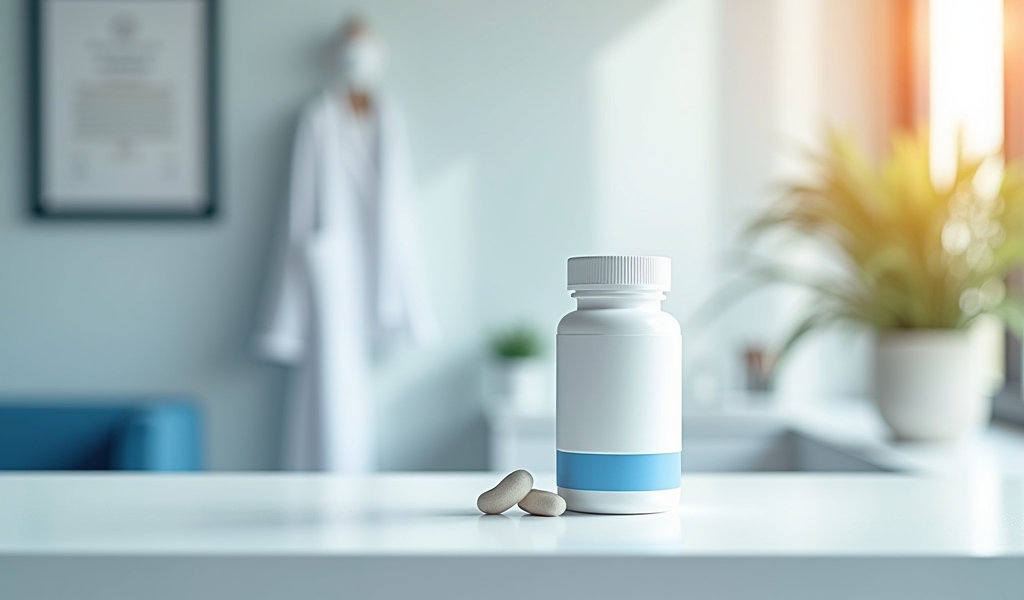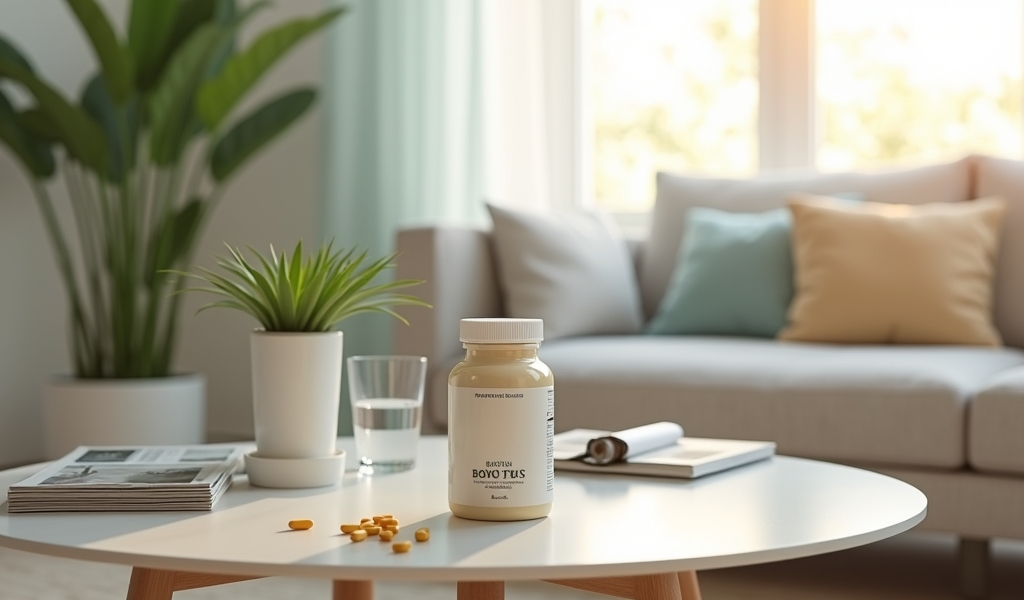Overview
Prescription-strength biotin supplements (10,000 mcg or higher) offer five key benefits for hair health including strengthening hair follicles, reducing shedding and breakage, promoting new growth, improving thickness and volume, and enhancing overall hair appearance. Unlike over-the-counter versions, these higher-dose formulations are medically supervised, undergo rigorous quality testing, and often work best for those with documented biotin deficiency, metabolic disorders, significant medical hair loss, or absorption issues, with noticeable improvements typically developing over 3-6 months of consistent use.
Table of Contents
- Introduction
- Understanding Biotin and Hair Health
- What Makes Prescription-Strength Biotin Different
- Benefit #1: Strengthens Hair Follicles
- Benefit #2: Reduces Hair Shedding and Breakage
- Benefit #3: Promotes New Hair Growth
- Benefit #4: Improves Hair Thickness and Volume
- Benefit #5: Enhances Overall Hair Appearance and Health
- Potential Side Effects and Precautions
- How to Get the Most from Your Prescription Biotin
- Myths vs. Facts About Prescription Biotin
- Who Should Consider Prescription-Strength Biotin
- Conclusion
- Frequently Asked Questions
Introduction
Are you frustrated with lackluster hair that refuses to grow or constantly breaks? You’re not alone. Millions of people struggle with hair concerns, and many are turning to prescription-strength biotin supplements as a potential solution. Biotin, also known as vitamin B7, is a water-soluble vitamin that plays a crucial role in maintaining healthy hair, skin, and nails.
While over-the-counter biotin supplements typically contain 1,000 to 10,000 micrograms (mcg) per dose, prescription-strength biotin supplements deliver significantly higher concentrations—sometimes 10,000 mcg or more—under medical supervision. This higher dosage is precisely what makes these supplements potentially more effective for addressing serious hair concerns.
In this comprehensive guide, we’ll explore five scientifically-backed benefits of prescription-strength biotin specifically for hair health. From strengthening hair follicles to enhancing overall appearance, you’ll discover why this potent supplement has become a go-to recommendation for those seeking to transform their hair health from the inside out.
Understanding Biotin and Hair Health
Biotin is a B-complex vitamin that serves as a coenzyme in the metabolism of fatty acids, amino acids, and glucose. In simpler terms, it helps convert the food we eat into energy our bodies can use. When it comes to hair specifically, biotin plays a starring role in the production of keratin—the primary protein that makes up our hair, skin, and nails.
This essential vitamin works at the cellular level to support the infrastructure of hair follicles. Healthy follicles mean stronger hair growth cycles and more resilient strands that are less prone to breakage and thinning. Think of biotin as the nutritional foundation upon which healthy hair is built.
When your body lacks sufficient biotin, your hair is often the first to show it. Common signs of biotin deficiency related to hair include:
- Increased hair shedding beyond the normal 50-100 strands per day
- Brittle, easily broken hair shafts
- Slow or stalled hair growth
- Thinning patches or diffuse hair loss
- Dull, lifeless appearance lacking shine and volume
While true biotin deficiency is relatively rare in developed countries, suboptimal levels can still impact hair health. Factors like pregnancy, certain medications, excessive alcohol consumption, and some intestinal disorders can deplete biotin levels, making supplementation potentially beneficial for many people experiencing hair concerns.

What Makes Prescription-Strength Biotin Different
Not all biotin supplements are created equal. The key difference between over-the-counter and prescription-strength biotin lies primarily in the dosage and quality control. While drugstore varieties typically offer between 1,000-10,000 mcg per serving, prescription formulations can deliver 10,000 mcg or more of highly purified biotin.
Prescription-strength biotin supplements undergo rigorous quality testing and are formulated under pharmaceutical standards. This means more consistent potency, fewer fillers, and potentially better bioavailability—how efficiently your body can absorb and use the vitamin. Many prescription formulations also contain complementary ingredients like collagen, silica, or other B vitamins that work synergistically with biotin.
Who typically qualifies for these higher-strength formulations? Healthcare providers most commonly prescribe high-dose biotin for:
- Patients with documented biotin deficiency
- Those with certain metabolic disorders
- People experiencing significant hair loss from medical conditions
- Patients undergoing treatments that affect hair growth
- Individuals with poor absorption due to gastrointestinal issues
Your doctor may recommend prescription hair loss treatment including high-dose biotin after evaluating your specific condition, rather than starting with self-prescribed supplements. This medical oversight helps ensure you’re addressing the true cause of your hair concerns while monitoring for any potential interactions or side effects.
Benefit #1: Strengthens Hair Follicles
The foundation of healthy hair begins at the follicle level. Prescription-strength biotin works by reinforcing the cellular infrastructure of hair follicles, creating a stronger base from which hair can grow. This strengthening effect is particularly important because weak follicles produce fragile hair that breaks easily and may not reach its full growth potential.
At the biochemical level, biotin serves as a crucial cofactor for enzymes that synthesize fatty acids needed for follicle health. According to research published in the Journal of Clinical and Aesthetic Dermatology, biotin supplementation can improve the structural integrity of both the follicle and the hair shaft itself by supporting keratin production.
Most users notice improvements in hair strength within 30-90 days of consistent use. Initial signs include less hair breakage when brushing or styling and reduced split ends. The full benefits to follicle strength typically manifest after 3-6 months of regular supplementation, as the hair growth cycle requires time to complete.
One patient at Dr Telx shared: “After two months on prescription-strength biotin, I noticed my baby hairs along my hairline were actually growing past the ‘fuzz’ stage for the first time in years. By month four, even my hairdresser commented on how much stronger my hair felt at the roots.”
Benefit #2: Reduces Hair Shedding and Breakage
Excessive shedding can be one of the most distressing hair concerns, whether you’re finding hair all over your pillow, clogging your shower drain, or constantly on your clothes. Prescription-strength biotin targets this issue by addressing a key factor in hair retention: the strength of the hair shaft itself.
Biotin helps reduce shedding through multiple mechanisms. First, it strengthens the cortex of the hair shaft, making it less prone to breakage. Second, it helps extend the anagen (growth) phase of the hair cycle, keeping hairs anchored in the scalp for longer periods before they naturally shed. Third, it improves the elasticity of the hair, allowing it to bend rather than break under stress.
Clinical evidence supports these benefits. A 2020 study published in Dermatology and Therapy found that women with self-perceived thinning hair who took a supplement containing biotin experienced significantly reduced hair shedding after 90 days compared to the placebo group.
The reduction in shedding is often one of the first noticeable benefits of prescription-strength biotin. Many users report seeing fewer hairs on their brush or in the shower within the first month of consistent use. This early win provides motivation to continue the regimen for the longer-term benefits that follow.
Benefit #3: Promotes New Hair Growth

Beyond simply preserving the hair you have, prescription-strength biotin can stimulate the growth of new hair by optimizing the conditions needed for follicle activation. This vitamin is essential for the production of keratin, the protein that makes up approximately 97% of hair structure.
When biotin levels are optimal, your body can produce keratin more efficiently, potentially awakening dormant follicles and encouraging new growth. This is particularly beneficial for areas where thinning has occurred but follicles are still viable—think of it as providing the nutritional fuel your follicles need to resume production.
The effectiveness varies somewhat based on hair type and underlying conditions. Those with temporary thinning due to stress, postpartum hormonal changes, or nutritional deficiencies often see the most dramatic improvements. For those with androgenetic alopecia (pattern hair loss), biotin works best when combined with other targeted treatments as part of a comprehensive personalized health program.
While biotin isn’t a miracle cure for baldness, realistic expectations include seeing new growth primarily in areas where miniaturization has begun but complete follicle death hasn’t occurred. New growth typically appears as fine “baby hairs” after 2-3 months, with these hairs gradually thickening and lengthening over the following months with continued supplementation.
Benefit #4: Improves Hair Thickness and Volume
Perhaps one of the most visually dramatic benefits of prescription-strength biotin is its effect on hair thickness and volume. This improvement occurs at both the individual hair strand level and in terms of overall hair density.
At the microscopic level, biotin helps increase the diameter of each hair shaft by supporting robust keratin production. Thicker individual strands mean hair that appears fuller even without an increase in the actual number of hairs. This improvement in hair caliber also means greater resilience against breakage, further enhancing volume by allowing hairs to grow longer before breaking.
Before and after scenarios often show remarkable differences in overall appearance. Consider the case of Maria, a 42-year-old patient who began prescription-strength biotin after experiencing postmenopausal thinning: “Within four months, I went from needing volumizing products and careful styling to hide my scalp to having naturally full hair again. My ponytail circumference increased by nearly an inch.”
Many prescription biotin formulations enhance this volumizing effect by including complementary ingredients like zinc, vitamin E, and marine collagen. These additions work synergistically with biotin to support the structural integrity of hair and maximize thickness gains.
For those seeking enhanced volume, patience is key—the most significant improvements typically become apparent after 3-6 months of consistent use as new, thicker hairs cycle in and replace older, thinner strands.
Benefit #5: Enhances Overall Hair Appearance and Health
Beyond measurable factors like strength and thickness, prescription-strength biotin delivers improvements in the overall appearance and quality of hair that can transform your entire look. These benefits extend to characteristics like shine, texture, manageability, and color vibrancy.
Biotin helps smooth the cuticle layer of the hair shaft—the overlapping scales that protect the inner structure. When these cuticles lie flat and intact, hair naturally reflects more light, creating that coveted healthy shine. Additionally, stronger, more moisturized hair maintains styling better and resists environmental damage that can make hair look dull and frizzy.
The synergistic effect of biotin with other nutrients creates a comprehensive approach to hair health. For instance, biotin works alongside vitamin C to support collagen production around hair follicles, vitamin E to protect against oxidative damage, and zinc to support protein synthesis and tissue growth—all contributing to visibly healthier hair.
Long-term users of prescription-strength biotin often report that their hair not only looks better but also feels different—softer, more resilient, and requiring less styling product to look good. This improvement in hair quality often translates to simplified hair care routines and increased confidence in wearing more natural styles.
Potential Side Effects and Precautions
While prescription-strength biotin is generally well-tolerated by most people, it’s important to be aware of potential side effects and necessary precautions before starting any high-dose supplement regimen.
Common side effects of high-dose biotin may include:
- Mild skin rashes or acne in some individuals
- Digestive discomfort including nausea or mild stomach cramping
- Potential interference with certain laboratory tests (particularly important to note)
Perhaps the most significant concern with high-dose biotin is its ability to interfere with various laboratory tests, including thyroid function tests and cardiac troponin tests used to diagnose heart attacks. This interference can lead to falsely high or low results, potentially affecting medical decisions. Always inform your healthcare providers about your biotin supplementation before any blood work.
Drug interactions are relatively uncommon with biotin, but it may reduce the effectiveness of certain anticonvulsant medications. Additionally, raw egg whites contain a protein called avidin that can bind to biotin and prevent its absorption, so consuming large amounts of raw egg whites is not recommended while taking biotin supplements.
Consult with a healthcare provider before starting high-dose biotin supplementation if you:
- Are pregnant or breastfeeding
- Have a history of allergic reactions to supplements
- Take multiple medications
- Have kidney disease or impaired kidney function
- Are scheduled for laboratory testing in the near future
This professional guidance ensures that biotin supplementation is appropriate for your specific health situation and won’t interfere with other aspects of your care.
How to Get the Most from Your Prescription Biotin
Maximizing the benefits of prescription-strength biotin requires more than just taking the supplement consistently. Following optimal dosing practices and complementary lifestyle habits can significantly enhance your results.
For dosing schedules, most healthcare providers recommend taking prescription biotin once daily with a meal that contains some healthy fats, as biotin is better absorbed alongside fat-containing foods. Morning consumption is often advised to support energy metabolism throughout the day, though the supplement can be taken at any consistent time that works for your routine.
Several complementary nutrients can enhance biotin’s effectiveness for hair health:
- Vitamin C: Supports collagen production essential for hair follicle strength
- Iron: Necessary for carrying oxygen to hair follicles
- Zinc: Plays a role in DNA and protein synthesis for hair growth
- Omega-3 fatty acids: Nourish hair follicles and reduce inflammation
- Silica: Helps strengthen hair and improve texture
Lifestyle habits that optimize biotin’s effects include:
- Staying well-hydrated (at least 8 glasses of water daily)
- Reducing heat styling that can damage hair structure
- Using gentle, sulfate-free hair care products
- Protecting hair from excessive sun exposure
- Practicing stress management (chronic stress can counteract biotin’s benefits)
Track your progress effectively by taking monthly photos in consistent lighting and position, measuring your ponytail circumference if applicable, and keeping a journal of observations about shedding, texture, and growth rate. Patience is key—while some benefits begin appearing within weeks, the most dramatic improvements typically emerge after 3-6 months of consistent use.
Myths vs. Facts About Prescription Biotin
The popularity of biotin has led to numerous misconceptions about its capabilities and limitations. Let’s separate fact from fiction regarding prescription-strength biotin supplements.
Myth: Biotin will work for all types of hair loss.
Fact: While biotin can improve hair health for many conditions, it’s not equally effective for all types of hair loss. It works best for thinning related to nutritional deficiencies, stress, and temporary hormone fluctuations. For androgenetic alopecia (pattern baldness), biotin is best used as part of a comprehensive treatment approach that might include other medications like minoxidil or finasteride.
Myth: More biotin always means better results.
Fact: There is a ceiling effect with biotin. Beyond certain dosages (typically around 10,000 mcg daily), additional increases may not provide proportionally greater benefits and could potentially increase the risk of side effects or test interference. This is why medical supervision is important for prescription-strength formulations.
Myth: Results will be immediate and dramatic.
Fact: Hair grows approximately ½ inch per month, and the hair growth cycle takes time. While some users notice reduced shedding within weeks, significant improvements in growth, thickness, and overall appearance typically take 3-6 months of consistent use. Patience and realistic expectations are essential.
Myth: Biotin can change your natural hair texture or color.
Fact: Biotin supports healthier growth of your natural hair. It cannot change curly hair to straight, alter your natural hair color, or reverse graying, which is determined by genetics and melanin production. It can, however, make your natural texture appear more defined and your color more vibrant through improved hair health.
Myth: Once you achieve results, you can stop taking biotin.
Fact: The benefits of biotin supplementation generally last only as long as you continue taking it. When you stop, your hair will gradually return to its previous state over several months. For ongoing improvements, consistent supplementation is typically necessary.
Understanding these realities helps set appropriate expectations and ensures you’re making informed decisions about your hair health journey with prescription-strength biotin.
Who Should Consider Prescription-Strength Biotin
Prescription-strength biotin isn’t necessary for everyone experiencing hair concerns. Understanding who might benefit most from these higher-potency formulations can help you determine whether to discuss this option with your healthcare provider.
Medical conditions that may warrant prescription-strength biotin include:
- Diagnosed biotin deficiency (rare but serious)
- Biotinidase deficiency (a genetic disorder affecting biotin metabolism)
- Severe malabsorption conditions like inflammatory bowel disease or celiac disease
- Pregnancy-related hair loss that persists postpartum
- Medication-induced hair thinning (from certain anticonvulsants, antibiotics, or hormonal treatments)
Hair concerns that respond particularly well to high-dose biotin include:
- Diffuse thinning without complete baldness
- Excessive breakage and brittleness
- Slow-growing hair that plateaus at shorter lengths
- Post-illness or post-stress shedding
- Age-related changes in hair density and diameter
For those who don’t qualify for prescription strength or prefer to start with less intensive options, alternatives include:
- Lower-dose (1,000-5,000 mcg) over-the-counter biotin supplements
- Comprehensive hair and nail formulations containing biotin plus supporting nutrients
- Biotin-enriched topical products like shampoos and conditioners
- Dietary adjustments to increase natural biotin intake
- Addressing potential underlying causes like thyroid disorders or iron deficiency
Consulting with healthcare professionals experienced in advanced treatment approaches can help determine the most appropriate path for your specific situation. They can evaluate whether your hair concerns might benefit from prescription-strength biotin or if another approach would be more suitable.
Conclusion
Prescription-strength biotin supplements offer a powerful approach to addressing hair concerns from the inside out. Through strengthening hair follicles, reducing shedding and breakage, promoting new growth, improving thickness and volume, and enhancing overall hair appearance, high-dose biotin can transform not just your hair but also your confidence and self-image.
As we’ve explored throughout this article, the benefits of prescription-strength biotin are scientifically supported, but proper expectations are important. Results develop gradually over months rather than days, and biotin works best as part of a comprehensive approach to hair health that includes proper nutrition, gentle hair care practices, and addressing any underlying medical conditions.
Before beginning any high-dose supplement regimen, consulting with a healthcare provider is essential. They can help determine whether prescription-strength biotin is appropriate for your specific situation, monitor for any potential interactions or side effects, and ensure you’re addressing the true root causes of your hair concerns.
With the right approach, patience, and consistent use, prescription-strength biotin may help you achieve the stronger, thicker, more vibrant hair you desire. The journey to healthier hair takes time, but many find the results well worth the investment in this powerful nutritional support for their hair’s natural growth and strength.
Frequently Asked Questions
Is prescription-strength biotin covered by insurance?
Insurance coverage varies widely by provider and plan type. Some insurance plans may cover prescription biotin if it’s deemed medically necessary for diagnosed deficiencies or specific medical conditions.
How long before I see results from prescription-strength biotin?
Most people notice reduced shedding within 1-2 months, with visible improvements in thickness and growth appearing around the 3-4 month mark. Full results typically develop after 6 months of consistent use.
Can prescription-strength biotin affect my laboratory test results?
Yes, high-dose biotin can interfere with various lab tests, particularly thyroid function and cardiac markers. Always inform healthcare providers about your biotin supplementation before any blood work.
Will prescription-strength biotin help with male pattern baldness?
Biotin alone has limited effectiveness for genetic pattern baldness. For this condition, it works best as a complementary treatment alongside medications specifically targeting androgenetic hair loss like finasteride or minoxidil.
Can prescription-strength biotin reverse gray hair?
No, biotin cannot reverse or prevent gray hair, as graying is caused by a decline in melanin production determined by genetics and age, not by biotin levels.

